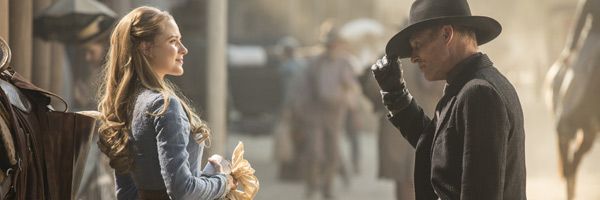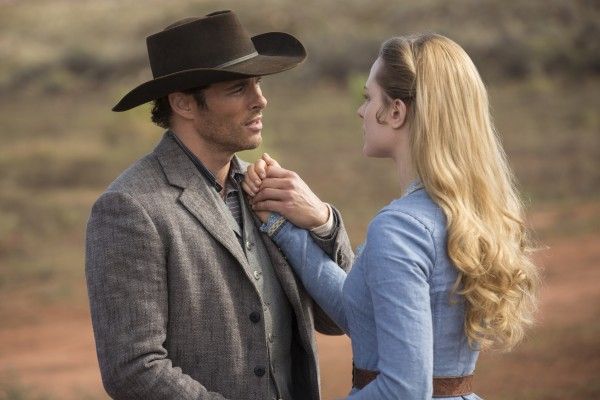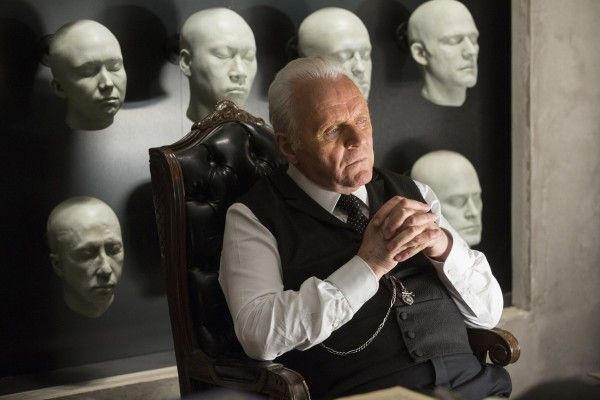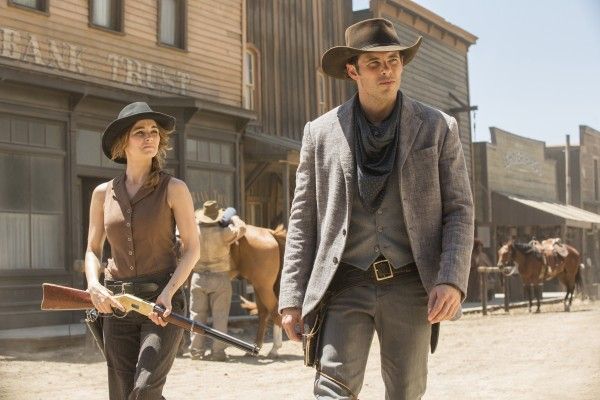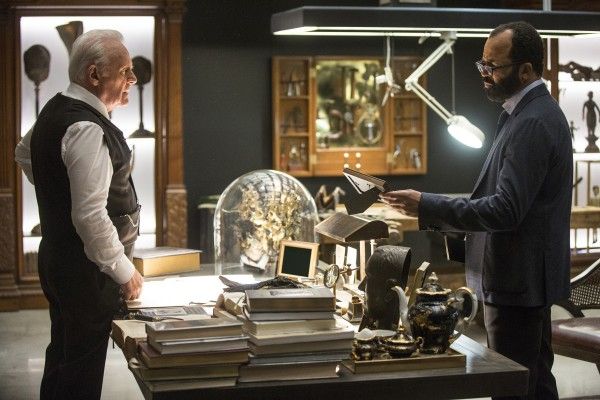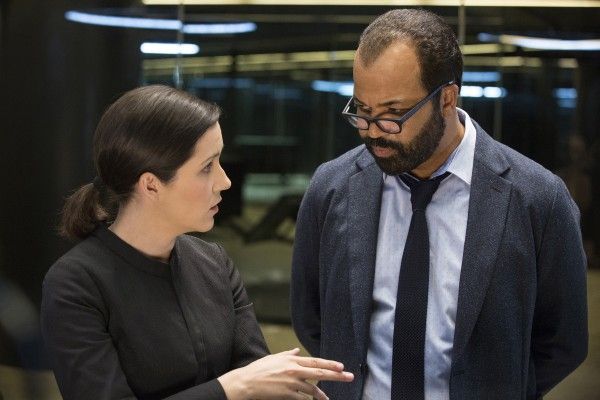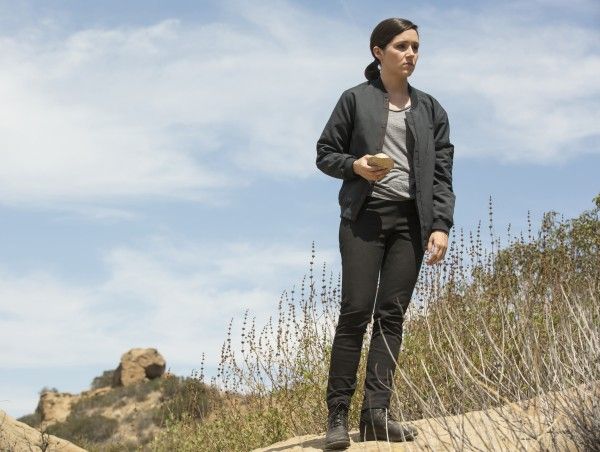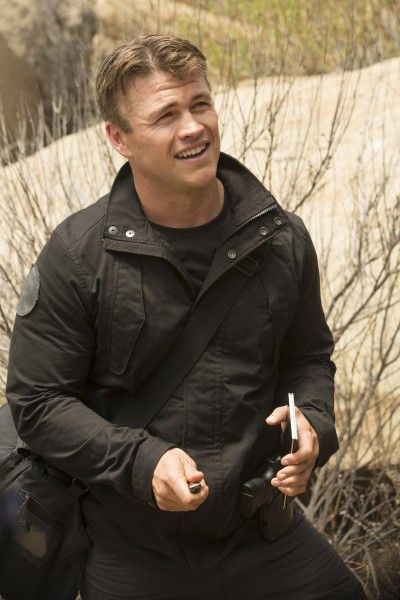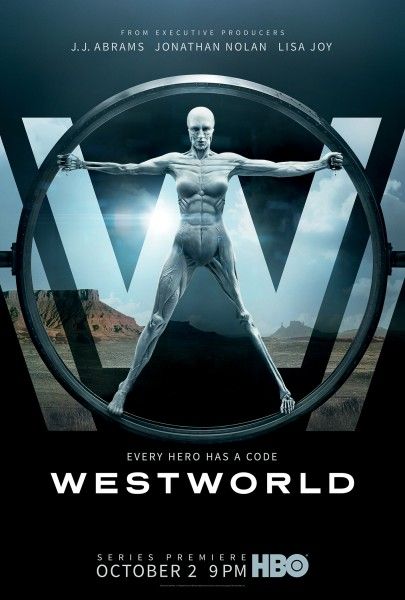If you could forget all of the bad things that have happened to you, would you? Or would you rather live life with that pain, that pain that makes you human? This is one of the central thematic questions at the heart of “The Stray,” Westworld’s third and arguably least successful episode so far. (Note: It was still a great episode of television, just not quite as engrossing as the first two installments. I’m ready for this show to pull the trigger, as they say.) It’s the question Bernard’s wife asks Bernard (Jeffrey Wright). It’s the question Bernard asks Dolores (Evan Rachel Wood). It’s the question the hosts have never been given the option of deciding and implementing in their own lives… until now.
Westworld further commits to the slow, tense burn in “The Stray,” picking up many of the story threads we’ve seen in previous episodes. Maeve (Thandie Newton) remembers seeing Teddy’s (James Marsden) body behind-the-scenes of Westworld. William (Jimmi Simpson) and Logan (Ben Barnes) continue their exploration of the theme park. And the members of the Westworld Programming Division continue to ignore some pretty glaring warning signs. Iceberg dead ahead, guys.
We’re given more affirmation than ever before that the glitches in Dolores’ programming is a result not just of Ford’s reveries, but of intentional changes made by Bernard. During one of Bernard and Dolores’ frequent conversations, Bernard admits as much. He also asks Dolores if she would like to stay the way she is — questioning, remembering, putting things together — or if she would like to stay “safe.” Dolores doesn’t fully understand (or so she claims), but she also muses enough to convince Bernard that her new consciousness is something worth saving.
Of course, part of Bernard’s choice is driven by his own grief. We get confirmation that he did have a son, Charlie, and that his son did die. When his wife (played by the always great Gina Torres) asks Bernard if he would rather forget their child now that he is gone, Bernard says he would not. The pain is all he has left. He chooses the same for Dolores: the pain of consciousness. But there is a difference between the pain of losing a child and the pain of realizing that your entire existence is designed for the perverse pleasures of the rich. Something to think about, Bernard.
We learn about Charlie’s death from an off-hand remark from Ford. It’s hard to get a read on the enigmatic figure, but he talks about Bernard’s dead son and his long-dead business partner, Arnold, like he slices into the head of that host: with no hint of empathy. They’re not real, he keeps repeating to any of his employees who, for one moment, begin to show some empathy for the hosts. For someone who spent his introductory scene reminiscing with one of the oldest hosts in the park, Ford has very little affection for his creations here. Is he trying to convince himself or does he really believe this? Did he and Arnold fight over this belief?
When Bernard tells Ford that two of the erratic hosts were having a conversation with Arnold, Ford doesn’t seem to be surprised. Is this because he is the one who is creating these “problems”? Or is he simply playing things close to the chest? One of the biggest pieces of information we got in “The Stray” came in Ford’s explanation of the bicameral mind in relation to the hosts. Are the rogue hosts beginning to hear a voice they believe to be a god? Is it Ford? Is it Bernard? Is it The Gunslinger/Man in Black (Ed Harris)?
We don’t get much Man in Black in this episode, but, when we do, he seems to take over the role of other hosts in the minds of rogue hosts. We see it with Dolores in the barn in this episode and we saw it with Maeve last episode, when the Native American became the Man in Black. Could the Man in Black be a manifestation of this rogue code, a manifestation of some android god, a manifestation of Arnold? Correct me if I’m wrong, but I don’t think we’ve ever seen the Man in Black interacting with a guest. We’ve seen Westworld Programming Division seemingly talk about him, but that can be misleading. Could The Gunslinger not exist in corporeal form in the way we’ve assumed so far? Perhaps he’s not host or guest, but something else altogether.
Meanwhile, Dolores' behavior within Westworld has become increasingly erratic. She plays her part in her romance with Teddy, but is increasingly frustrated with the promise of “somedays.” She wants to run away now. She wants to take control of her own fate now. By the end of the episode, she has, using the gun she found (or planted) buried in the dirt to stave off her host attacker, then riding off into the foothills, potentially to look for Teddy. She collapses in William’s arms, the very picture of a damsel-in-distress, as she has been programmed to be. But is she the damsel-in-distress? She pulls the trigger. She has control over whether or not she stays in her narrative loop (unless this is part of Ford’s much-talked-about new loop). What will Dolores do next? Now that we know she can pull the trigger, the sky is her limit. (But, really, is the sky like a Truman Show-limit, or are we looking at actual stars here?)
For the second week in a row, we saw a Westworld employee fully comprehend the fact that, aside from their programming, hosts could easily kill humans. When Stubbs (Luke Hemsworth) and Elsie (Shannon Woodward) wander out into the deepest reaches of the desert to find a woodcutter host who has wandered away from his narrative loop, it ends in blood. Not Elsie’s blood, but that’s only because The Woodcutter chose to bash his own head in rather than anyone else’s. Will the experience bring Elsie over to Stubbs’ philosophical side: Don’t trust the A.I.s. Sleep with a gun under your pillow.
And why did The Woodcutter kill himself? If he wanted to die, he could have easily done it sooner. Was it a symptom of him fighting against his own programming? He wanted to kill Elsie, but he also couldn’t, so he compromised. Or was it something he wanted Elsie to see? Did he wait to commit the act until she was in front of him on purpose? Did his “god,” the code Ford tells Lowe (whether truthfully or not) Arnold put into the hosts’ programming, tell him to do it? Did The Woodcutter remember his pain?
Rating: ★★★ Good
Miscellanea:
Elsie seems particularly weirded out by The Woodcutter’s carving of Orion, implying that there is no reason he should have been carving the constellation. Could this be another clue that Westworld is not, in fact, on Earth? Is there another reason why Orion might not be visible in the night sky that could give us more information about where Westworld is located?
We find out that William and Logan not only work together, but that William is Logan’s future brother-in-law. Poor William.
Ford finally gives Teddy a backstory. But he was probably better off without one… This Wyatt character seems like a real piece of work. More to come on that later, I’m sure.
I’m digging the internet theory that William and The Gunslinger are actually the same person and that William’s storyline is actually taking place much earlier in time than the main narrative featuring The Gunslinger. I’m not sure if I ascribe to this theory, but it’s fun to think about.
Bernard’s wife mentions envying Bernard’s position away from everything, “out there,” during their Skype convo. Another potential clue that Westworld is taking place on another planet?
Ford made it sound like Arnold committed suicide, but was that the case? And, if so, is there more to the story? If not, what happened?
Is Arnold Arnold’s first name or last name? Inquiring minds want to know.
“Must be part of my backstory,” says Stubbs at one point in “The Stray.” But, really, are they all robots? Except Anthony Hopkins. Anthony Hopkins is never a robot.
I only just realized that Stubbs is The Other Hemsworth. Have you guys known this all along? Because now I can’t stop thinking about it.

